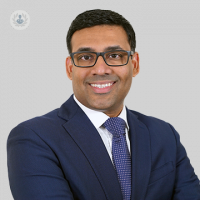How to deal with anxiety
Escrito por:Feeling anxious is a normal reaction to a difficult or threatening situation. Nervousness, apprehension, your heart rate accelerating, perhaps a sensation of nausea – we all experience these feelings throughout our lives and they can be part of a natural fight-or-flight response to danger, which could save your life. However, when anxiety becomes a regular occurrence in your life or a continuous problem; if it strikes in severe bouts where it feels like the world is going to end; if it is having an impact on your day-to-day life, then it is time to see a specialist. Renowned psychiatrist Dr Abrar Hussain is here to explain how to deal with anxiety disorders.

What can trigger an anxiety attack?
Sometimes it can be easy to find a trigger. For example, people with a specific phobia of something can have anxiety when they see that particular object. In some cases, it's much harder to find a trigger. Panic attacks, for instance, can come out of the blue without any obvious trigger. Sometimes, people can also experience anticipatory anxiety, so they feel anxious even before they're in an environment that is likely to be stressful. In conditions such as PTSD (post-traumatic stress disorder) anxiety can start after people witness something that reminds them of the past traumatic event. This means that the trauma has not been fully processed and still affects people.
Can anxiety be cured?
Anxiety is treatable. What you need initially is a good clinical assessment which will focus on your individual symptoms and analyse what is really going on. For example, is it just anxiety, a combination of anxiety and depression, or something else entirely? Sometimes medical conditions like a thyroid problem can manifest as anxiety. Also, some patients learn to use certain substances, like drugs or alcohol to manage their anxiety, and this can actually make things worse. A good clinical assessment considers all these factors.
There are some general strategies that can be used to manage anxiety. I recommend that people with anxiety try and manage their stress levels and find a balance in their life between work and other activities. Other things that can help a patient’s state of mind include:
- Healthy diet
- Regular exercise
- Maintaining a good sleep routine
- Avoiding tablets and computers at night
- Good social life and maintaining friendships/relationships
Moving on to more specific management: the best way to manage anxiety is through a combination of medication and psychological techniques.
Based on your individual set of symptoms, there are a number of different models of psychological therapy.
- CBT (cognitive behavioural therapy) is often effective for treating anxiety and depression. It works on challenging negative thoughts and implementing certain behavioural changes to manage physical and cognitive symptoms.
- EMDR (eye movement desensitisation and reprocessing) – this is a specific therapy aimed at people with traumatic histories and where anxiety stems from a traumatic event.
- CAT (cognitive analytic therapy) – this specialised therapy works with the patient's relationships; both with themself and others, and that can also help in trying to understand certain behaviours which can lead to reinforcing anxiety.
Lastly, medication is quite helpful as well and it works quicker than therapy. Generally, we aim to use medication to restore the balance of two particular chemicals in the brain – serotonin and noradrenaline. Medication may show good effects within a couple of weeks, but it usually takes up to six weeks for medication to start working properly.


